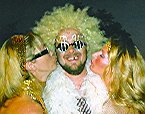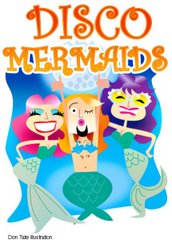semi + memoir
A lot of memoirs seem to focus on exceptionally sad childhoods, or exceptionally funny ones. Funny memoirs often sound like they’re written by someone having a ton o’ fun reminiscing, while sad ones often seem therapeutic. But memoir-writing is not what I want to talk to you about. I want to talk about semoirs. Semoirs are those stories adults write about their own childhoods, but masked as fiction for children.
One of the most common topics popping up around the Disco Mermaid dinner table concerns books written by adults, about children, that don’t necessarily seem to be written for children…but instead, for adults. Don't deny it; you know what I'm talking about. At some point, you’ve all started reading a children’s book and said, “Would a kid actually want to read this?”
One of the Mermaids recently started reading a book because the reviews described it as a hilarious story. But this middle grade novel is more of a dark comedy, poking fun at the eccentricities of a dysfunctional family. Unfortunately, those dysfunctions are the types dealt with by real children every day. And when you’re a child, there is nothing funny about being in that situation…as that Mermaid will attest. If I told you which book I’m talking about (which I won’t), and you were to grab it off a bookshelf and look at the author’s bio, you’d see that the author had a similar upbringing. Knowing that, the book almost reads like the author wanted to write a memoir, but didn’t want to fully contemplate the meaning of his/her childhood (and that contemplation is essential to a good memoir). Instead, the dysfunctions come across as darkly humorous because the reader never gets a good sense of the character’s emotions when facing those dysfunctions. Yet when real children face those same problems, it’s extremely embarrassing…if not horrifying. And that type of realistic dark humor is not something I think elementary school children can appreciate yet. Furthermore, readers who have better childhoods than the one presented, but who know children with those problems, may not come away very empathetic.
I've been coming across too many children’s books that read like they’re written by an adult looking back…either reminiscing (which comes off as an aloof main character), or glossing over serious issues by removing hardcore emotions (which is…well…it's just not good). I think the reason I’m finding so many books like this is because, no matter which writing conference you attend or how-to book you read, the “write what you know” mantra is endlessly played.
Well, I say we should stop this madness! Instead, let's write what we’re interested in, or what we want to know. Because when we write purely from the School of What We Know, it's hard to fully appreciate what other people don’t know…and that's where we tend to gloss over things. I don’t know how many times I’ve critiqued a friend's manuscript and listened to him/her say, “But that's what really happened.” Right, but it happened to you...in real life. Your situation was a little different from your main character’s, and it just didn’t seem like it would happen to your character in that way. You're too stuck in your own past and not your character's present. (Of course, I'm talking to my generic friend here, and not you…specifically.)
Similarly, I recently read a book which mentioned the unusual occupation of the main character’s father. That interesting fact wasn’t dropped until after I knew the main problem of the book. The moment that occupation was revealed, I started imagining all of the extra problems that career could cause for the main character. Unfortunately, his career played no role in the book (other than as a funny aside). And when I came across an interview with the author a short while later…can you guess what I’m about to say?…she'd simply plunked her father’s career into the book. So she didn’t fully appreciate how interesting that bit of information was, and how it could possibly be a distraction to the story (or, better yet, how it could have added to the story, had she explored it more deeply).
What I’m saying is, if an adult writes a story based on a real childhood experience, it's important to remember how it actually felt to be that child, and not write it from the perspective of experience gained through expensive therapy…unless, of course, the author is writing a memoir.
Because semoirs are driving me crazy!
- Jay
P.S. On second thought...nevermind. It's probably just me.







12 comments:
Semoiring might seem less intimidating to many because perhaps it seems easier and/or less work than writing a purely fictional story. Personally, I think semoiring requires much more work because you have to constantly distance oneself. "You are not your character." I can't remember who said what I consider one of my writing mantras: "Don't write what you know. Write want you WANT to know."
Jay - An arrow through my brain and heart! The book I am working on falls hopefully on the semoir side of emotional reality - but I can't say enough from the "writer's POV" how important it is for me to be writing this book. I truly hope I am retaining emotional truth for Milo (my main character) while allowing my demons to fight it out over the spoils - because both are necessary for the process.
There's a larger discussion I guess about what kids want to read and what books become "chosen" for them...but we can chat that next time!
Great insight and wisdom my friend -
Great post, Jay. I've often heard it said that award-winning books (the Newbery Award, in particular) appeal more to adults than to the audience for whom they were written. This is certainly NOT true for many, many Newbery winners, so I hope no one throws any rotten vegetables my way! But I've found this to be true in several cases with my upper elementary school students--books that I think are so well written aren't always a hit with the 9 and up crowd.
Although I won't mention any examples of those kinds of books, one that I feel DOES appeal to both adults and kids alike is Cindy Lord's RULES.
Absolutely, Emily...I think it's the "distancing oneself" that trips many people up.
Alan, pluck out those arrows, dude. Just distance yourself, be honest, and you're good to go!
It's so funny, Natalie, because Rules is the one book we all agree accomplishes this difficult feat perfectly. But, Cynthia Lord isn't writing about her own childhood, so maybe that's why she was so willing to grasp the genuine emotions. So read Rules for the rules!
- Jay
Very thoughtful, thought-provoking post, Jay. Well done.
Interesting insights, Jay. :)
I have to admit, the mg book I've been writing began as a semoir. It was so much fun to walk down memory lane. But then, it also became boring. Now, there are many things inspired by childhood experiences, however highly embellished to the point of fiction.
I was at the NY SCBWI conference last winter where the legendary Susan Cooper was a keynoter (her first time speaking to an audience of writers!), and the core of her presentation was to write what we know not on an event-specific or superficial level, but on an emotional level. (Digging through notebooks to find exact quote...):
"'Write what you know well' doesn't mean what you think. Write about the deep things. Not recent experience, but the deep part of the mind. The compost heap - shadowy matters, things we see as we look back. Patterns emerge. Your real ideas will come out of the deep hauntings, will fly out of the sky like a hawk unexpected."
She was amazing. Had everyone in the audience spellbound and searching for those deep hauntings. It was worth my thousand bucks just to hear her speak.
I don't write about what I know (who knows what that is), but I do have to write about WHERE I know.
My novels have to be set in places where I've been, even though I fictionalize the settings. There are so many places I'd like to set stories, but unless I hang out there first I can't do it.
Hey again, Jay,
You're right about RULES--Cindy didn't write about her own childhood, but the idea for the story stemmed, in part, from her own children's situations. Same with BRIDGE TO TERABITHIA. But with both of these books, I think it's a case of real-life events inspiring vs. taking over a plot.
Wow, great discussion! I agree with Natalie that RULES was an exceptional book because it was very kid friendly as well as a good read for adults. Even though it wasn't her own childhood experience, the fact that she was able to separate herself so much from her own children was amazing.
I think Ellen Hopkins accomplished that in CRANK also.
And Jay, I'm glad you mentioned the part about writers saying "But that's what really happened." I know I've been guilty of saying that. But real life doesn't always follow good plot line points and rarely happens in exciting three-act parts. Life is scattered and weird. (Well, mine is anyway.)
Nicely done. ;-)
Robin
I'm not finished thinking about this one yet, so I hate to see it get buried.
Can we talk about the practicalities of writing *for* children instead of writing about our recollected childhoods?
And how about a list of books, like RULES and CRANK, that we feel succeed.
Post a Comment